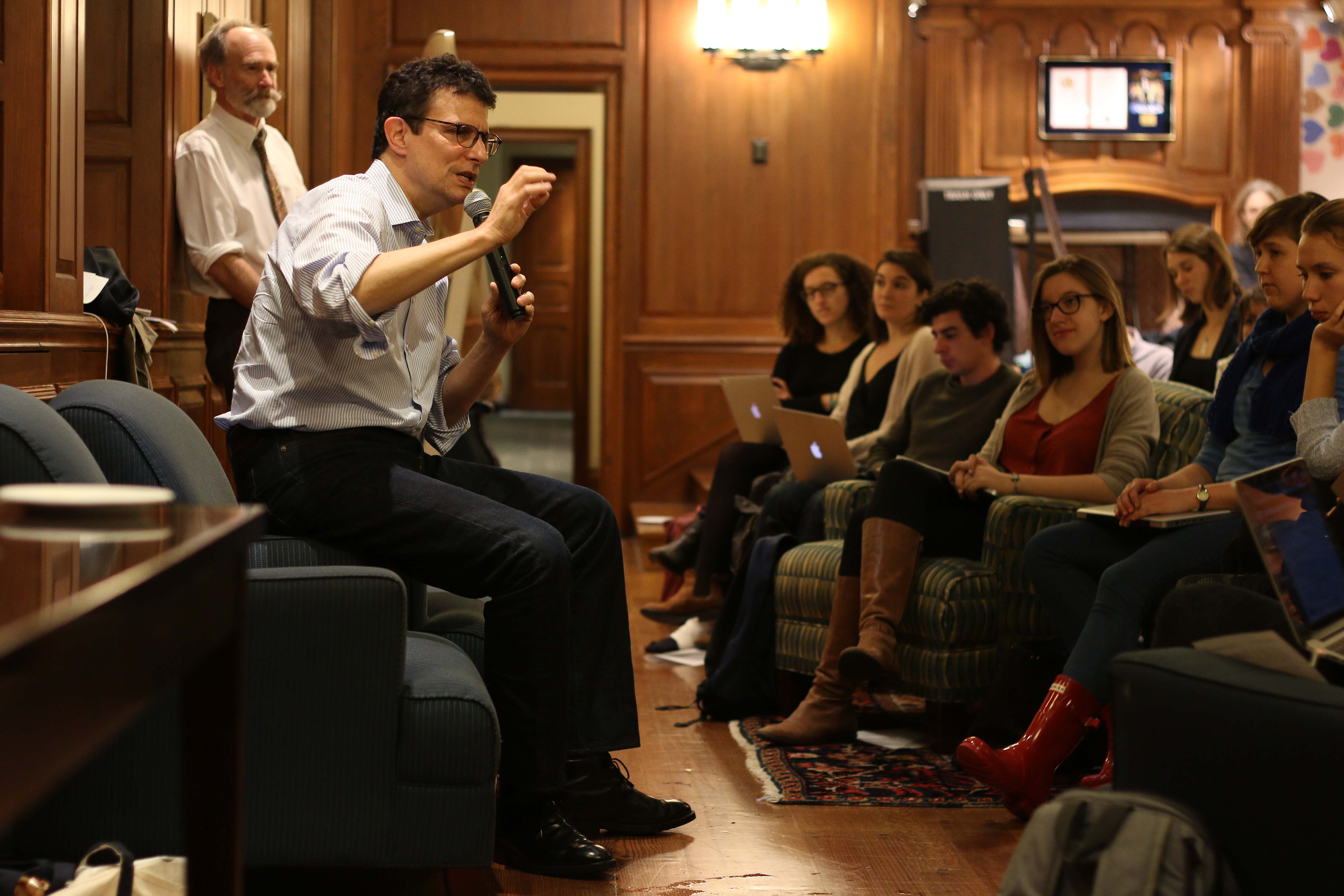
David Remnick, Pulitzer Prize-winning author and editor-in-chief of The New Yorker magazine, spent Thursday evening at Branford College discussing his career, his writing and the importance of good coffee.
The master’s tea, which drew a crowd large enough to fill the entirety of the Branford Common Room, was structured in a traditional question-and-answer format hosted by English professor Fred Strebeigh. For about an hour, students, faculty and alumni asked Remnick about his trajectory from Princeton student, to Moscow bureau chief for the Washington Post, to staff writer and later editor-in-chief of The New Yorker.
The room was filled with aspiring writers full of questions on how to transition from college student to successful journalist. Remnick described how he once took a position as a sports reporter at the Washington Post before going to Moscow, despite sports not being his area of expertise.
“My best advice to young reporters would be: anytime someone in the business asks you, ‘Do you know anything about [any topic] … ?’— whatever it is, your answer should be, ‘Absolutely!’” Remnick said, eliciting laughter from the audience.
Remnick emphasized the combination of luck, flexibility and hard work that have defined his career. For example, he said, he earned a C+ and D while enrolled in Russian classes at Princeton, yet a few years later found himself headed to Russia for the Washington Post. In addition, when he was promoted to editor of The New Yorker in 1998, Remnick said, the last time he had been an editor of anything was for his high school publication, the Pascack Valley High School Smoke Signal — which had, he added, “the most politically stupid name you could come up with.”
“What I’m trying to say is that you’re like a ball in a pinball machine,” he said. “There’s no magic formula for this stuff.”
In addition to answering questions about his own life, Remnick discussed The New Yorker and how the magazine continues to be an eccentric collection of a variety of forms of writing and media, as well as a source of news. As the magazine increases its online presence, it has welcomed a new breed of writers: while some New Yorker writers still write for print, immersing themselves in long projects for months at a time and then undergoing a fastidious editing process, others are drawn to the allure of online media and the immediate response to their work, Remnick said.
He called The New Yorker an “oddball mixture,” where readers can find gag cartoons in the middle of 10,000-word pieces about Syria.
“There’s something magical about the whole recipe,” he said. “There’s something eccentrically wonderful.”
The talk ended on a serious note, when a student questioned Remnick about how attending an institution like Yale affects individuals’ future prospects in journalism. Remnick, in a somber moment that contrasted with the fairly spirited and often humorous tone of the rest of the talk, told listeners about his parents’ disabilities growing up and his youngest child’s autism. Life brings what it brings, Remnick said, and he emphasized the importance of going to places not so much like Yale.
Attendees interviewed after the talk praised Remnick for connecting his personal narrative to his journalism career.
Anstress Farwell GRD ’78 said she has been a reader of The New Yorker since she was an undergraduate at the University of Connecticut. She agreed with Remnick’s description of The New Yorker as housing a diversity of voices. She added that the magazine has always been eccentric, but that its eccentricity has changed over the years. It is no longer as whimsical or sarcastic as it used to be, she said, but she said she actually prefers the newer style under Remnick.
“There’s such a variety of things; he’s right about that,” Farwell said. “They start with the short [pieces], there’s very serious thought-provoking things — that variety of voices is great.”
After the talk concluded, Remnick hosted another event, in which he critiqued student articles from The Yale Daily News Magazine, The Politic, The Yale Scientific, The Globalist, The Yale Herald and The New Journal, whose editors had all submitted one piece. Strebeigh said Remnick’s commentary was the fourth such event involving an expert commenting on students’ work, with the first featuring James Bennet, the editor-in-chief of The Atlantic.







